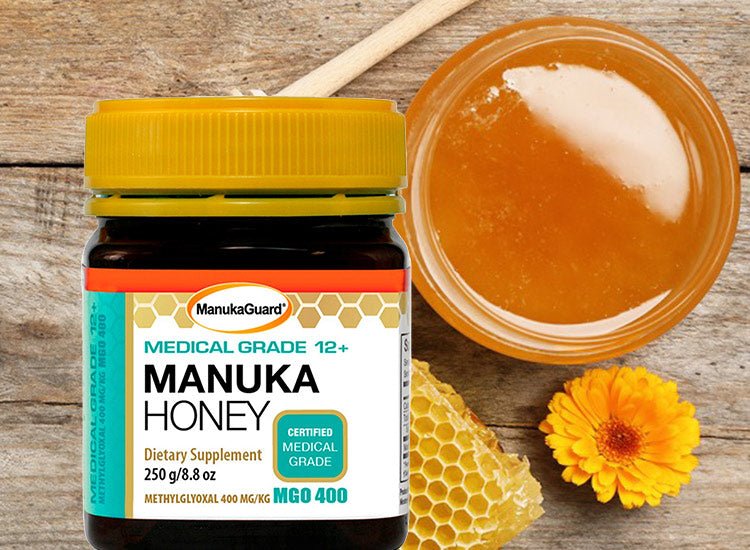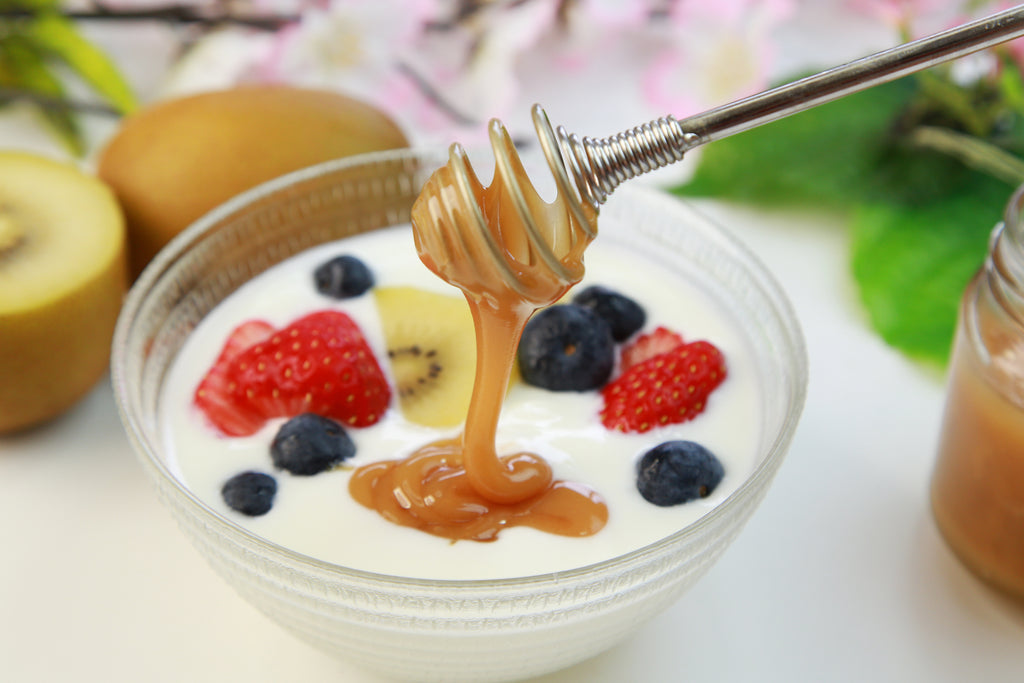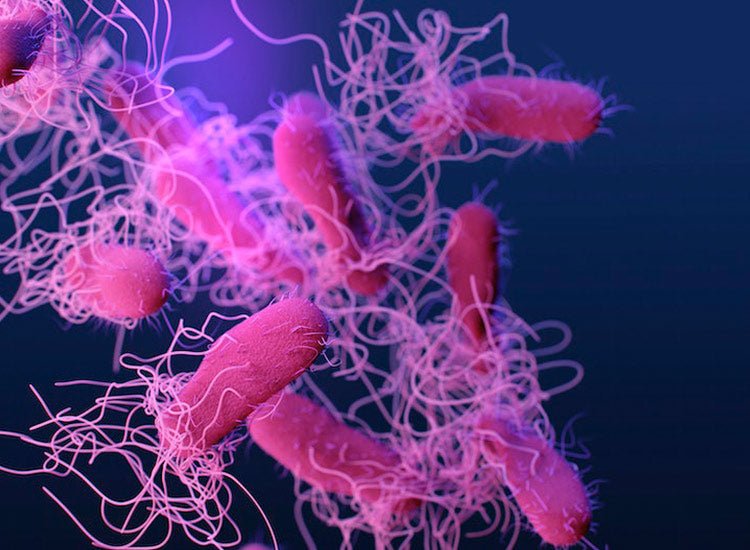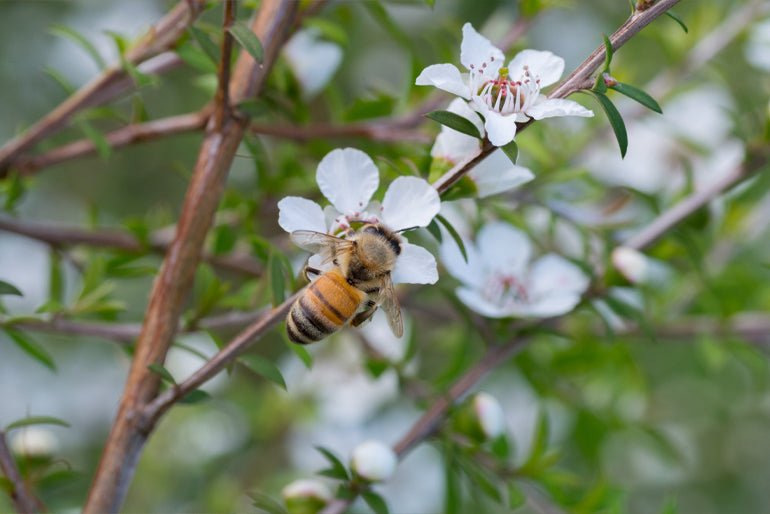
What is Medical Grade Manuka Honey and Why You Should Care

In recent years, medical-grade manuka honey has gained attention as a potential game-changer in the field of alternative medicine. Derived from the nectar of the manuka tree (Leptospermum scoparium) native to New Zealand, medical-grade manuka honey offers unique properties that set it apart from regular honey.
In this article, we will explore what medical-grade manuka honey is, why it is considered superior to regular honey, and delve into its active compound, methylglyoxal (MGO).
Additionally, we will discuss the clinical significance of manuka honey in treating antibiotic-resistant infections, referencing the systematic review titled "Clinical Significance of Manuka and Medical-Grade Honey for Antibiotic-Resistant Infections: A Systematic Review."
Throughout the article, we will highlight ManukaGuard as a leader in producing medical-grade manuka honey.
What is Medical Grade Manuka Honey?
Medical-grade manuka honey is a specialized type of honey that possesses unique non-peroxide antibacterial activity.
This antibacterial activity is primarily attributed to MGO, a naturally occurring compound in high concentrations of manuka honey.
Regular honey, on the other hand, typically contains hydrogen peroxide as its main antibacterial component.
The difference in antibacterial activity between medical-grade manuka honey and regular honey distinguishes medical-grade manuka honey as a superior therapeutic option.
The Superiority of Medical Grade Manuka Honey
1. Non-Peroxide Activity: Regular honey's antibacterial properties stem from hydrogen peroxide, which can be easily inactivated by heat, light, or enzyme activity.
Medical-grade manuka honey, on the other hand, retains its antibacterial activity even when exposed to these factors.
This non-peroxide activity makes medical-grade manuka honey a more reliable and stable treatment option.
2. Unique Antibacterial Spectrum: The antibacterial spectrum of medical-grade manuka honey is significantly broader compared to regular honey.
It has been demonstrated to effectively combat antibiotic-resistant bacteria, including notorious strains like methicillin-resistant Staphylococcus aureus (MRSA) and vancomycin-resistant Enterococcus (VRE).
The ability of medical-grade manuka honey to target these antibiotic-resistant strains makes it highly relevant in combating the global health challenge of antimicrobial resistance.
3. Enhanced Healing Properties: Medical-grade manuka honey exhibits impressive wound-healing properties, making it an invaluable tool in managing chronic and infected wounds.
The antibacterial activity of manuka honey helps prevent infections, while its anti-inflammatory and antioxidant properties promote tissue regeneration and wound closure.
These healing properties have been demonstrated in clinical and real-world applications, establishing medical-grade manuka honey as a potential adjunct to conventional wound care.
MGO: The Active Compound in Manuka Honey
Methylglyoxal (MGO) is the active compound responsible for the non-peroxide antibacterial activity in medical-grade manuka honey. It is formed by the conversion of dihydroxyacetone, a compound naturally present in the nectar of manuka flowers. The concentration of MGO in manuka honey varies depending on factors such as the region, climate, and harvesting time.
The presence of MGO in medical-grade manuka honey gives it a unique advantage over regular honey. MGO offers a reliable and stable antibacterial activity that is not easily affected by external factors.
This compound plays a vital role in the efficacy of medical-grade manuka honey against antibiotic-resistant infections.
Clinical Significance of Manuka Honey for Antibiotic-Resistant Infections
The systematic review "Clinical Significance of Manuka and Medical-Grade Honey for Antibiotic-Resistant Infections: A Systematic Review" provides significant insights into the therapeutic potential of manuka honey in treating antibiotic-resistant infections.
This review encompasses various clinical studies and laboratory experiments that evaluate the efficacy of manuka honey against antibiotic-resistant bacteria.
The systematic review's findings strongly support the clinical significance of medical-grade manuka honey in treating antibiotic-resistant infections. Numerous studies showcased the effectiveness of manuka honey in eradicating infections caused by MRSA and VRE, both notorious for their resistance to conventional antibiotics.
This effectiveness highlights the potential of medical-grade manuka honey as an alternative therapeutic option.
Furthermore, the review also emphasizes the broad-spectrum antibacterial activity of medical-grade manuka honey against other antibiotic-resistant bacteria, such as Escherichia coli, Pseudomonas aeruginosa, and Helicobacter pylori.
These results demonstrate the versatility of medical-grade manuka honey and its potential applications in various infectious diseases caused by resistant strains of bacteria.
ManukaGuard: A Leader in Medical Grade Honey
One brand that stands out as a leader in producing high-quality medical-grade manuka honey is ManukaGuard.
ManukaGuard has established itself as a trusted name in the industry, committed to delivering superior products backed by scientific research. Their attention to detail throughout the honey production ensures that the highest quality medical-grade manuka honey reaches consumers.
ManukaGuard's medical-grade manuka honey is sourced from remote regions of New Zealand, where the manuka trees flourish. This ensures that the honey harvested contains optimal levels of MGO, providing potent antibacterial activity. Rigorous quality control measures, including independent testing and certification, further solidify ManukaGuard's position as a leader in providing reliable medical-grade manuka honey.
Conclusion
Medical-grade manuka honey offers unique properties that set it apart from regular honey. Its non-peroxide activity, broad-spectrum antibacterial activity, and enhanced wound-healing properties make it a promising alternative therapeutic option, especially in treating antibiotic-resistant infections.
The presence of MGO distinguishes medical-grade manuka honey, granting it stability and efficacy in various clinical applications. The systematic review highlights that medical-grade manuka honey has significant clinical significance in treating antibiotic-resistant infections.
Brands like ManukaGuard play a crucial role in delivering high-quality medical-grade manuka honey to consumers, ensuring its therapeutic potential is harnessed to its fullest. With ongoing research and further exploration, medical-grade manuka honey may prove essential in addressing the global challenge of antimicrobial resistance and revolutionizing alternative medicine.
References:
Nolan VC, Harrison J, Wright JEE, Cox JAG. Clinical Significance of Manuka and Medical-Grade Honey for Antibiotic-Resistant Infections: A Systematic Review. Antibiotics (Basel). 2020 Oct 31;9(11):766. doi: 10.3390/antibiotics9110766. PMID: 33142845; PMCID: PMC7693943.
Related Blog Posts:






